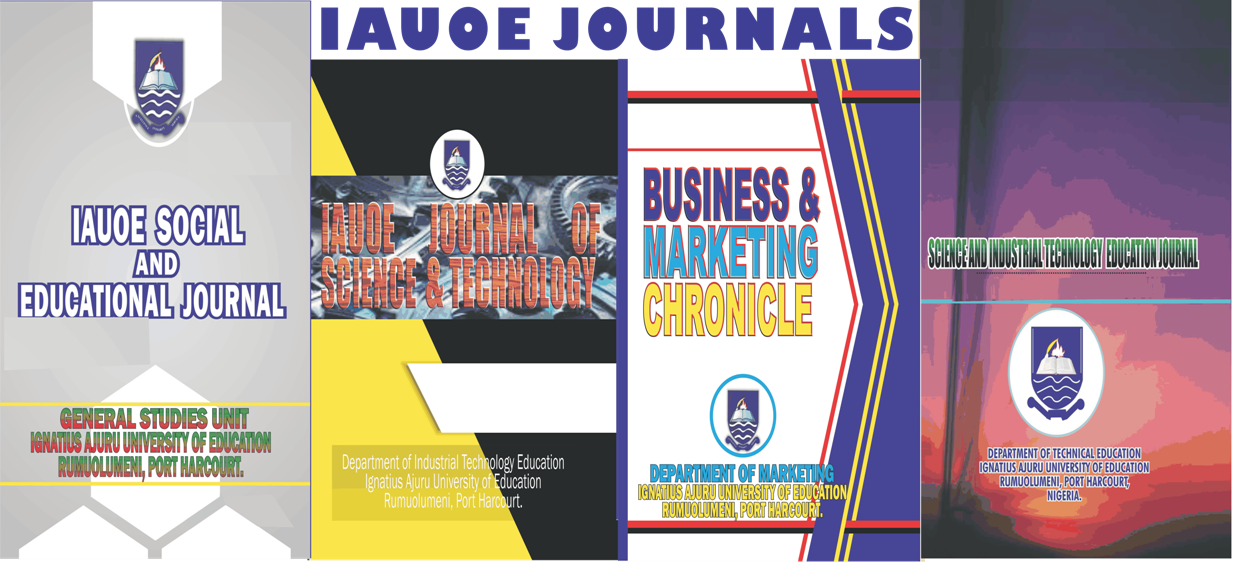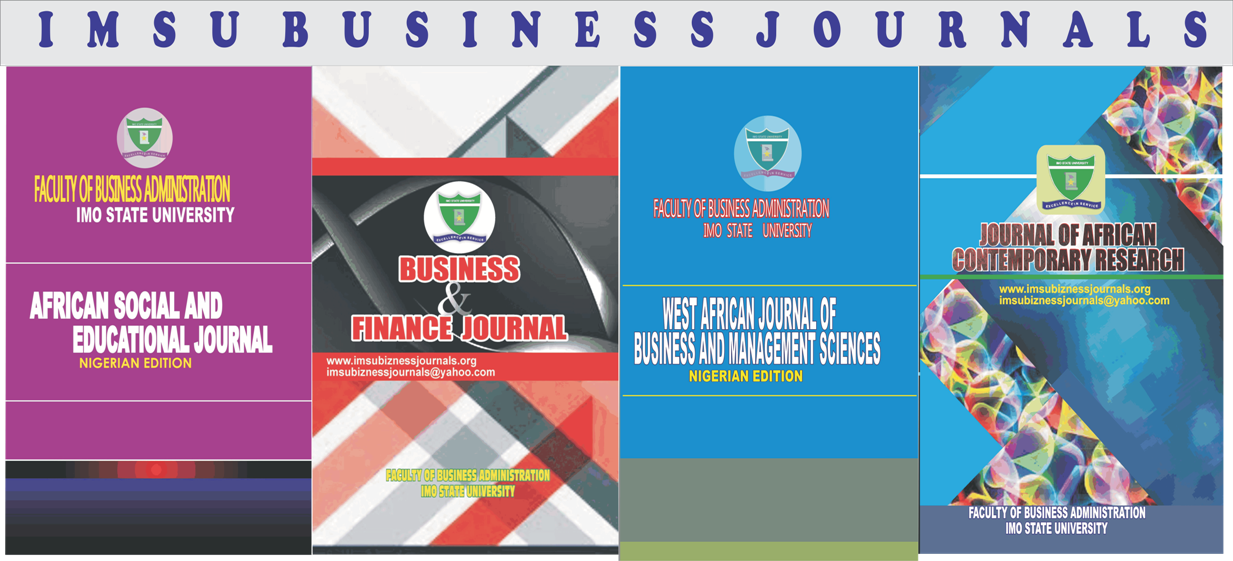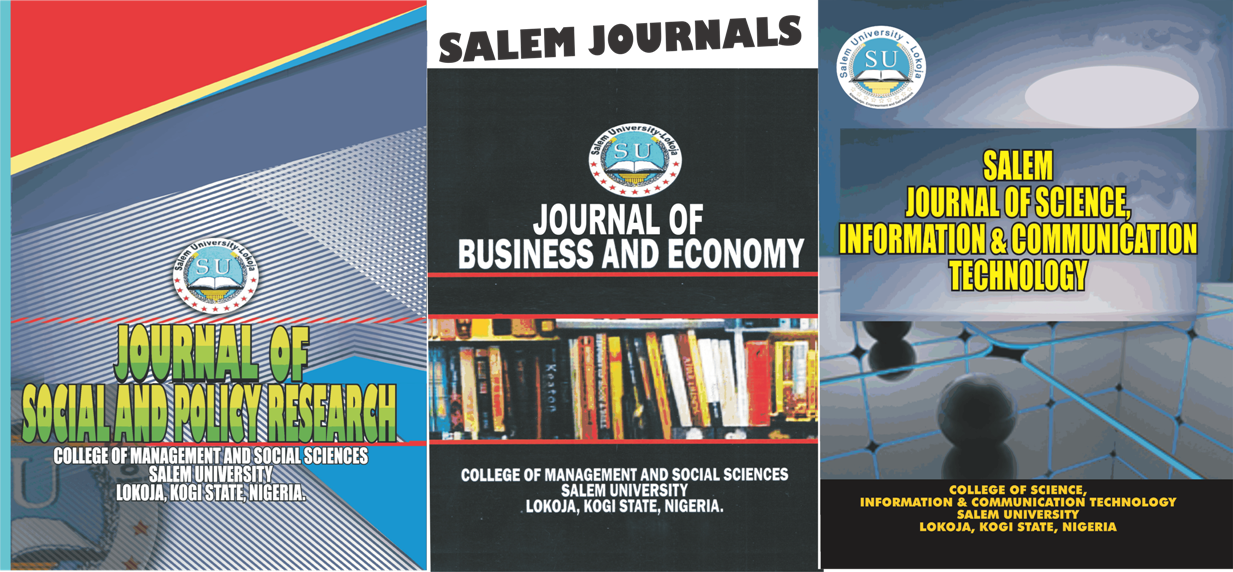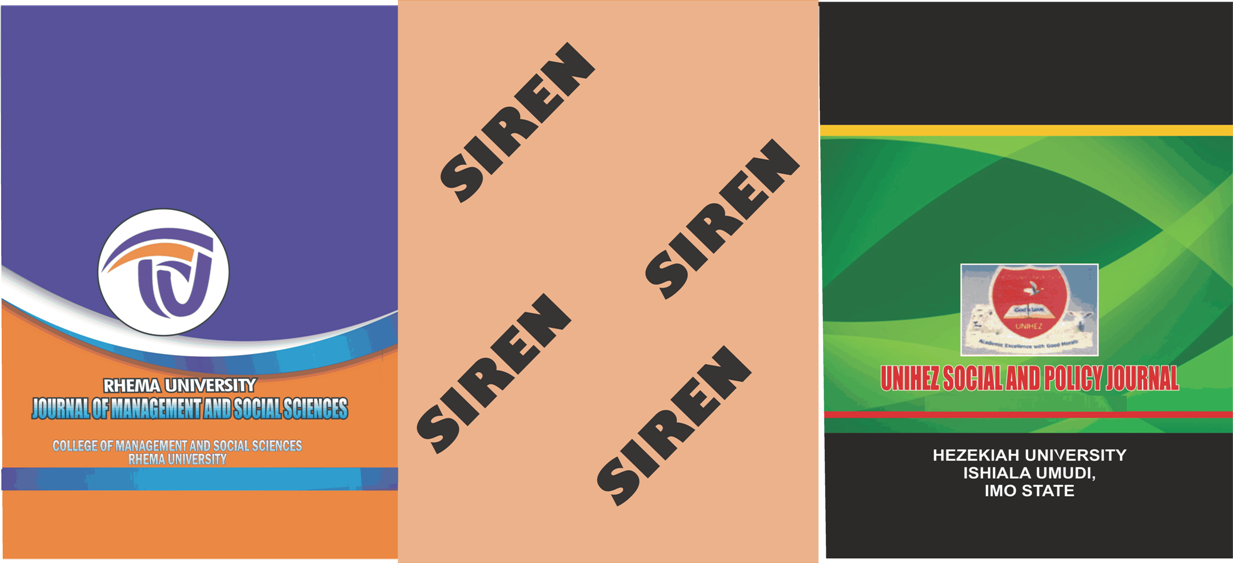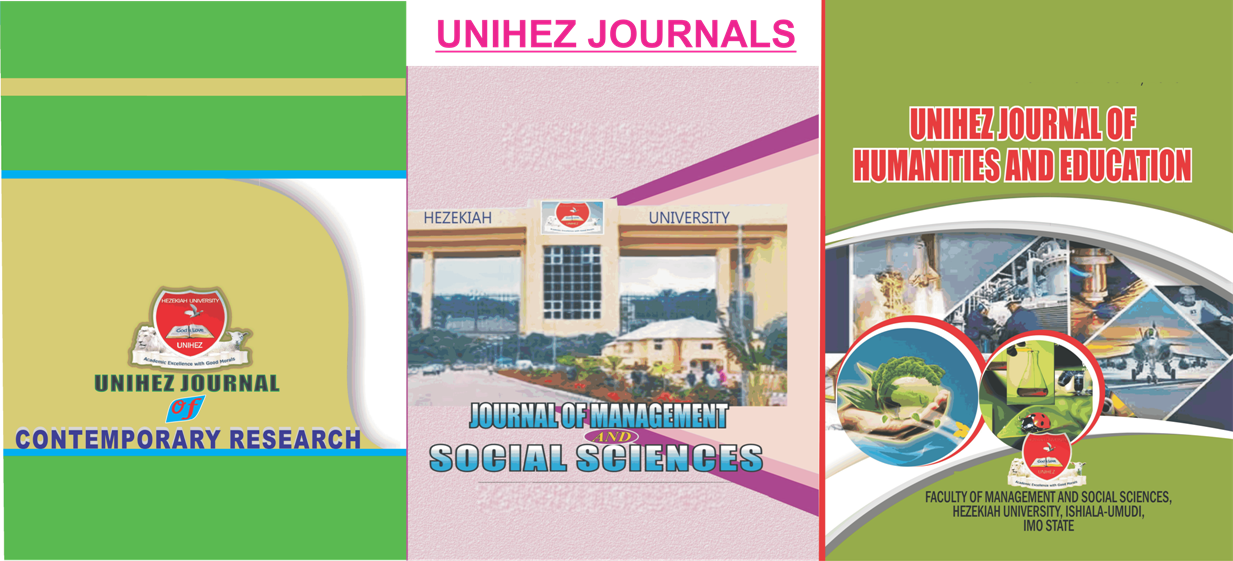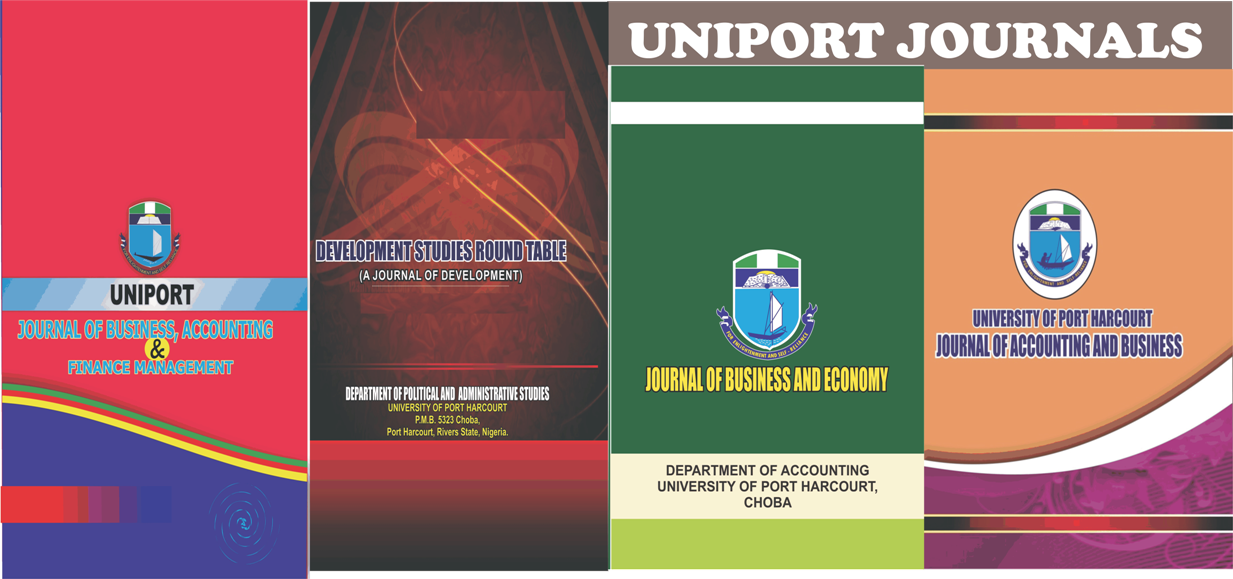2020 Archive
| 1 |
Title: ASSESSMENT OF REVENUE GENERATED ON NIGERIA ECONOMIC DEVELOPMENT FROM 1981-2018.pdf Author: AHMED ABUBAKARABDULLAHI PhD. Abstract: Abstract The study interrogates the role of internally generated revenue on Nigeria economic development from 1981-2018 with emphasis on manufacturing, solid mineral revenue and value added tax measured to total revenue generation. Data utilized was obtained from NBS/CBN published data from 1981-2018 and was analysed using inferential statistics. This includes Multiple Regression Analysis, Coefficient for correlations of independent sample and analysis of variance (ANOVA) for significant impact samples. Findings amongst others reveal that MR measured to the total revenue is 0.896 with a coefficient of 606.066 and p-value of 0.378 significant at 5% provides statistical evidence for rejection of first hypothesis and indicates that the MR positively affects the TREV of Nigeria over the period of the study, solid mineral revenue is 0.160 with the coefficient value of 78.613 and p-value of 0.874 obtained from the multiple regression results statistically significant at 5%, reveals that SR positively and significantly influences the total revenues generation in Nigeria, and the t-value for MR measured to the total revenue is 3.582 with a coefficient of 19.435 with the p-value of 0.001 significant at 5% provides statistical evidence that the selected variables significant impact on total revenues generation in Nigeria. The study concludes that; diversification of the revenue base of the country should be an urgent policy option to stimulate economic fortune in the long run and recommends that; to improve the revenue generation from manufacturing industries, solid minerals and vat, the Nigerian federal government should ensure that non-oil revenues that are collected are accounted for to the public in print and electronic media and properly utilized in the provision of social amenities that will provide not only a conducive environment for business to strive but also encourage tax compliance by tax payers in the county. Government should also be committed to establishing machinery to drive its non-oil revenue policies and strategies aimed at opening up the non-oil productive sector and setting it on the right track for revenue generation thereby eliminating all forms of bottlenecks that would sabotage the development of the Nigeria’s non-oil revenue potentials. Keywords: IGR, Economic development, manufacturing sector, solid mineral revenue and value added tax View |
| 2 |
Title: HOUSING, FINANCING AND NATIONAL HOUSING UNIT IN NIGERIA. A VARIANCE DECOMPOSITION AND IMPULSE RESPONSE APPROACH (TVIR).pdf Author: OKONKWO, C.F., ONUORAH, A.C. (PhD) AND OSIEGBU P.I. (PhD) Abstract: Abstract This paper investigated the Measures of Financing Housing such as Mortgage Financing Investments (MFI), Federal Mortgage Loans (FML), Primary Mortgage Loans (PML), Total Mortgage Deposits (TMD) and Mortgage Interest Rate (MIT) on the National Housing Units (NHU ) in Nigeria using Variance Decomposition, and Impulse Response Approach. The results of the( Loge) series showed that in the short run of period 1, 100% percentage of forecast variance in Housing development explained itself. While in the long-run of period 10, the percent of the forecast error variance becomes 78.79% revealing that (LogeNHU ) variable tends to dwindle as we further into the future. For the correlation between (LogeMIF), (LogePML), (MIT), (LogeFML) and (LogeTMD) on (LogeNHU) only (LogeFMl) and (LogeTMD) positively influencde (LogeNHU) in Nigeria. The shock of ((LogeNHU) to (LogeMIF), (LogeFML) and (MIT ), react positively into the future. The innovations of the shock of (LogeNHU) to ((LogePML) and ((LogeTMD) exhibit negative effects into the future. However, percentage forecast error of variance of (LogeMIF), (LogePML), (MIT), (LogeFML) and (LogeTMD) on (LogeNHU) . Only (LogeFMl) and (LogeTMD) confirmed some percentage of negligible influence on (LogeNHU) in the long run of period 10 by aggregated of 71.4%. ((LogeNHU)) in Nigeria driven by ( LogeMIF), ((LogeTMD) and (MIT).The study recommended the implementation of domestic and foreign investments into RED sectors to boost the Nigeria economy. Keywords: Mortgage Financing, Variance Decomposition, National Housing Units, Impulse Response Approach. View |
| 3 |
Title: EFFECT OF SUSTAINABILITY DISCLOSURE ON FIRM PERFORMANCE EVIDENCE FROM NON-FINANCIAL QUOTED COMPANIES IN NIGERIA.pdf Author: AZUKA OKECHUKWU (PhD) AND OFOR T. (PhD) Abstract: Abstract The broad objective of this study is to examine the effect of corporate sustainability disclosure on firm performance of quoted health care and consumer goods companies in Nigeria for the period of eight years (2011 – 2018). To achieve this objective, the study specifically sought to ascertain the extent to which employee health and safety sustainability disclosure, employee sustainability disclosure and governance sustainability disclosure affect firm different performance measures of accounting and market value (Return on Asset & Tobin Q). In this study, we employ ex-post facto research design on a panel data set which was secondarily sourced from related company’s’ annual financial reports. The formulated study hypotheses were tested by employing Panel Corrected Standard Error (PCSE) estimator while the probability values, (p- values) from the regression results formed the basis for decision making. The empirical study reveals that all three variables of interest; employee health and safety disclosure, employee disclosure and governance sustainability disclosure have insignificant effect on firm performance of both return on asset and tobin Q performance measures. Hence, we suggest that corporate managers should review policies relating to employee information disclosure if they aim to improve short run performance (return on asset) as well as long run performance (Tobin Q). We also recommend a ‘policy shift’ in the sense that managers may need to focus policy attention towards improved disclosure of information regarding to employee health and safety to maximize its gains. Keywords: Sustainability Disclosure, Employee Health and Safety, Governance Sustainability and Panel Corrected Standard Error Estimator View |
| 4 |
Title: IMPLICATIONS OF THE ACTIVITIES OF TAX PRACTITIONERS, FORENSIC ACCOUNTANTS AND ECONOMIC AND FINANCIAL CRIMES COMMISSION AT CURBING CORRUPTION IN OSUN STATE, NIGERI.pdf Author: OLUWAKAYODE, EBENEZER FOLUSO AND FAGBORO, GABRIEL DAMILOLA (PhD) Abstract: Abstract This study sought to know the implications of the activities of Tax Practitioners, Forensic Accountants and Economic and Financial Crimes Commission at curbing corruption in Osun State Nigeria. The objectives of the study were to ascertain the level of awareness of the use of Forensic Accountants for fraud detection and prevention among professional Accountants in Osun State, Nigeria; to evaluate the extent to which the activities of Forensic Accountants, Tax Practitioners and Economic and Financial Crimes Commission help in curbing corruption in Osun State, Nigeria. Survey design was adopted through the use of questionnaire for the study. The population of this study consisted of two hundred (200) members of staff (management, senior and junior) of the Office of the Accountant General, Osun State Ministry of Finance, Osun State Internal Revenue Service and other Agencies in Osun State from which a sample of one hundred and thirty- three (133) members of staff was selected using Yaro-Yamane sampling technique. One hundred and thirty-three (133) copies of questionnaire were administered out of which one hundred and twenty-five (125) copies were returned. Data were analysed using the Pearson Product Moment Correlation with the aid of Statistical Package for the Social Sciences (SPSS) version 20.0. The findings revealed that there is a positive relationship between the activities of Forensic Accountants and activities of Tax Practitioners at curbing corruption in Osun State. It was also found out that proper financial management would also help to reduce crime rate in Osun State, Nigeria. The study concluded that Accountants’ skills and Tax practitioners’ activities have significant effect on uncovering and reducing frauds in Osun State, Nigeria. Finally, the study recommended that Nigerian Universities should introduce Forensic Accounting courses to increase the quality of Accounting graduates from the Universities, among others. Key Words: Tax Practitioners, Forensic Accountants, Economic and Financial Crimes Commission, Fraud, Corruption, Osun State, Nigeria. View |
| 5 |
Title: CORPORATE SOCIAL RESPONSIBILITY AND FINANCIAL PERFORMANCE IN NIGERIAN QUOTED OIL AND GAS INDUSTRY.pdf Author: OJEDELE M.I. (PhD), AYODELE T.D. (PhD) AND OYINLOLA M.A. (PhD) Abstract: Abstract The paper investigated the direction of causality between CSR and financial performance of the quoted oil and gas industry. The data set contains ten years from 2014 to 2018 of firm specification variables. Data were gathered from audited financial reports of 8 purposively selected firms from quoted companies in the Oil and Gas industry, Nigeria Stock Exchange (NSE) Factbook and statistical Bulletin of the Central Bank of Nigeria. Granger causality test model was employed to investigate the direction of causality between Corporate Social Responsibility and Financial Performance. The result indicated that there was no causal relationship between corporate social responsibility and Return on Assets (χ2=3.479, p>0.05). Return on Asset does not Granger cause corporate social responsibility (χ2=2.279, p>0.05). Also, corporate social responsibility does not granger cause Return on Asset. The study concluded that significant feedback did not exist in any direction of causality between corporate social responsibility and profitability, but there is a positive relationship between them. Keywords: Corporate social responsibility, Granger causality, Nigeria, Profitability View |
| 6 |
Title: CASHLESS ECONOMIC POLICY AND THE OPERATION OF SMALL SCALE ENTERPRISES IN OSOGBO METROPOLIS, OSUN STATE, NIGERIA..pdf Author: AJAYI, EZEKIEL OLUWOLE (PhD) AND ONIKOYI, IDRIS ADEGBOYEGA (PhD) Abstract: Abstract As the cashless economic policy continues gaining ground in Nigeria, many small scale entrepreneurs are yet to completely agree that the policy actually have any benefit for them. This calls for a need to assess the effect of the policy on small scale enterprises which is the occupation of majority of the unbanked citizens in Nigeria. Thus, this study assessed challenges and benefits of adoption of cashless economic policy for small scale enterprises, among other objectives. Data for the study were collected through administration of questionnaire to hypothetical sample of 200 small scale enterprises in Osogbo metropolis of Osun, Nigeria. The data were analysed using frequency distribution analysis (FDA) and simple bar chart. The hypotheses were tested using multiple regression analysis. The result of findings shows that adoption of cashless policy has significant impact on small scale enterprises in terms of benefits and challenges. It was concluded that Nigerian small scale business that effectively and efficiently incorporate and integrate cashless system into their business strategy, with mindset of gaining and maximizing the benefits of cashless system and deliberately minimizing the impact of its challenges on their businesses would outperform those that do not. It was recommended that Nigerian small scale enterprises should invest considerable time and financial resources in getting relevant technology training and personal development that will facilitate effective and efficiency integration of cashless system into daily business transactions Key words: Cashless Economic Policy; Small Scale Enterprises; Performance View |
| 7 |
Title: CAPITAL STRUCTURE AND FIRMS PERFORMANCE IN OIL AND GAS AND MANUFACTURING COMPANIES IN EMERGING AND DEVELOPED COUNTRIES.pdf Author: EYONG, JOSEPH UBI AND EMEKA OKRERKE (PhD) Abstract: Abstract This research work examined capital structure and firm performance in oil and gas sector as well as manufacturing sector in emerging and developed economies. The study conceptualized developing economies using the Nigerian case study while the developed economies are conceptualized using the United Kingdom. The study employed a quarterly data sourced from the stock exchange market between the periods 2004 to 2019 under the panel frame work. We measure capital structure using long and short term debts along with total equity while firm performance was assessed using returns on asset. The study randomly selected 7 oil and gas sector and 20 manufacturing firm. The Study employed panel unit root test, Koa panel co-integration, panel regression and panel granger causality test. From the estimation, findings reveal that equity financing and long -term debt been one of the components of capital structure seems to exhibit a positive correlation on performance of oil and gas sector in Nigeria while short term debt exhibited negative and insignificant correlation on performance of oil and gas firm in Nigeria. In the developed country however, all the proxies for capital structure exhibited positive and appreciable relationship on firm performance for both oil and gas and manufacturing sector. View |
| 8 |
Title: EFFECT OF INCOME POLICIES ON REAL WAGES IN NIGERIA (1980 – 2017).pdf Author: D.B. EWUBARE PhD. AND AMAN LAWRENCE EKPO Abstract: Abstract This study investigated the effects of income policies on real wages in Nigeria, 1980 – 2017 using time-series data. The major aim of the study was to determine the major impacts of income policies on real wage rates in Nigeria.The specific objectives are to: investigate the relationship between Personal Income Tax Revenue (PITR,) on real wage rate in Nigeria. Determine the effect of Company Income Tax Revenue (CITR) on real wages in Nigeria. Examine the relationship between value Added Tax Revenue on real wages in Nigeria Examine the relationship between inflation rate and the real wage rates in Nigeria. Four hypotheses were formulated and these laid the foundation for the analysis. The research design adopted for the study was based on quasi-experimental research design. The data used for this study were obtained from classroom discussion, CBN Statistical Bulletin and various issues (1980 - 2017), World Bank data, text books and international journals. The researcher used the method of ordinary least square of regression analysis in the analyzing the data collected. Single multiple regression model was designed and used for the analysis. First order regression analysis were conducted which indicated the presence of spurious regression result as the R2>DW. Second order analyses were also conducted using co-integration tests, Granger Causality Tests, and Augmented Dickey-Fuller, and Error Correction Mechanism Tests. The study separated income policies into Personal Income Tax Revenue, Company Income Tax Revenue, Value Added Tax Revenue and a check explanatory variable, Inflation Rate. The results shows that Personal Income Tax Revenue (PITR) is negatively related to the Real wages revenue rate over the period as expected a prior. As the PITR increases by a unit income, the RWR decreases by 2.45% and vice versa. The Company Income Tax Revenue (CITR) result also reveals that it has a negative but significant relationship with Real Wages Revenue RWR, over the period understudy. The result shows that as CITR increases by a unit, RWR decreases by 2.48 units and vice versa. The Value Added Tax Revenue (VATR) result reveals that it has a negative and significant relationship with RWR. It shows when VATR increases by a unit, RWR also decreases by 335.6 and vice versa. The result shows that as INFR (Inflation Revenue Rate increases by a unit percentage, RWR also decreases by 704.2% and vice versa. Findings indicates personal income taxes have become an increasingly source of revenue for state government in Nigeria. Since personal income tax Amendment Act of 2011 all the 36 states including Abuja use personal income tax. Income policy represent compulsory payments that reduces workers spendable income after payment of taxes, which is detrimental to work effort. The study found, among others, that the PITR, CITR, VATR, and INFR have negative but significant impact on real wage rates over the period of the study. The study concluded that these variables representing income policies have strong impact on the real wage rates and recommended, among others, that the government and other financial authorities should ensure the income policies should have a human face on the workers as they bear the final brunt of the consequences of the income policies. View |
| 9 |
Title: COMPONENTS OF CASH FLOW AND THE PERFORMANCE OF DEPOSIT MONEY BANKS IN GHANA.pdf Author: P. C. MUOTOLU AND E. O. NWADIALOR PhD. Abstract: Abstract The study investigated the relationship between the components of cash flow and the performance of Deposit Money Banks in Ghana. The specific objectives were to determine the relationship between cash flow from operating activities (CFOA), cash flow from investing activities (CFIA), cash flow from financing activities (CFFA), free cash flow (FCFA), and cash flow to debt (CFDT), and the performance (Return on Asset -ROA) of deposit money banks in Ghana. The dependent variable is the ROA while CFOA, CFIA, CFFA, FCFA, and CFDT are the independent variable. Bank Size (BSZE) and Leverage (LEVG) are the control variables. The study adopted an ex-post facto research design and data for the study were secondary, sourced from the annual reports of the selected deposit money banks for a period of eleven years spanning 2009 to 2019. The sample size is eight (8) Deposit Money Banks in Ghana. Multiple regression analysis was used to test the hypotheses. The results showed among others that CFOA and CFDT were found to have a positive and insignificant influence on ROA while CFIA, CFFA, and FCFA were significant in influencing ROA performance in Ghana at a 5% level of significance. Also, BSZE has had a positive and significant influence on the ROA at a 1% level of significance. Finally, LEVG was found to have a negative significant influence (at 5%) on ROA. The study recommended that leverage should be discouraged in Ghana since it influences performance negatively. The study concluded that cash flow components greatly influenced performance in Ghana and therefore, managers should handle cash flow management efficiently to have an enhanced performance. The study contributed to knowledge by extending the scope of the study, including more variables and modifying existing models. Keywords: Cash flow, Performance, Free cash flow, Return on asset and Cash flow to debt ratio. View |
